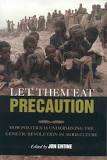Let Them Eat Precaution
Let Them Eat Precaution: How Politics is Undermining the Genetic Revolution in Agriculture is a 2005 book edited by American author and journalist Jon Entine, about how politics is affecting the use of genetically modified food. The 10 contributing authors from the United States and the United Kingdom provide insights into the benefits of agricultural biotechnology, offer an international perspective on why some groups are opposed to it, and suggest potential solutions to the controversy.
 Hardcover of Let Them Eat Precaution: | |
| Author | Jon Entine |
|---|---|
| Subject | Scientific skepticism |
| Publisher | Aei Press; |
Publication date | December 7, 2005 |
| Pages | 220 |
| ISBN | 978-0844742007 |
Background
This book grew out of a 2003 conference, "Food Biotechnology, the Media, and Public Policy", held at the American Enterprise Institute.[1] Jon Entine, the editor, is an adjunct fellow at the institute and a scholar in residence at Miami University in Ohio.
Chapters
| Title | Topics | Author |
|---|---|---|
| Beyond Precaution |
-Agricultural Biotechnology on Hold |
Jon Entine |
| Title | Topics | Author |
|---|---|---|
| Global Views on Agricultural Biotechnology | Leaders' Views on Biotechnology: Results of a Survey | Thomas Jefferson Hoban |
| The Promise and Perils of Agricultural Biotechnology |
-The Challenge of Food Security in Developing Countries. |
C. S. Prakash and Gregory Conko |
| Trade War or Culture War?" The GM Debate in Britain and the European Union |
- Europe and the Precautionary Principle |
Tony Gilland |
| Title | Topics | Author |
|---|---|---|
| Hunger, Famine, and the Promise of Biotechnology |
-Supposed Obstacles to Biotechnology in Africa |
Andrew S. Natsios |
| Why GM Crops are Being Overregulated in the Developing World |
-Trying to Make a Case Against the Regulations |
Robert L. Paarlberg |
| Can Public Support for Biotechnology Be Salvaged? |
-Food and Feelings |
Carol Tucker Foreman |
| Title | Topics | Author |
|---|---|---|
| Deconstructing the Agricultural Biotechnology Protest Industry |
-Money |
Jay Byrne |
| Functional Foods? and Biopharmaceuticals:The Next Generation of the GM Revolution |
-Functional Foods |
Martina Newell-McGloughlin |
| Challenging the Progressive Myth of Antibiotechnology Environmentalists |
-Campaign of Fear and Fantasy |
Patrick Moore |
Reception
"Let Them Eat Precaution does a superb job of educating the reading public on the basic issues of genetically modified foods. The distinguished authors provide a devastating point-by-point refutation of the anti-GMO activists' false claims, providing a reasoned, scientifically grounded perspective on this critical issue. As the Marie Antoinette title implies, though the affluent may be leading the charge against GMO foods, it is the poor who are most likely to suffer the effects of activists that falsely claim to speak for the world's poor." —Thomas DeGregori, professor of economics, University of Houston, and author of Origins of the Organic Agriculture Debate.[3]
"A well-funded global antibiotech activist campaign, abetted by European Union regulators more interested in political pandering than good science, threatens to starve millions of the world's poorest people by denying them access to environmentally safer and higher yielding biotech crops. The distinguished experts assembled in Let Them Eat Precaution make it abundantly clear that humanity's health and well-being depend on innovation, not a technological freeze in the name of the "precautionary principle," which demands perfect safety from all new technologies. The contributors carefully document not only the policy challenges facing agricultural biotechnology but the real benefits—from a massive reduction in pesticide use to a slew of new pharmaceuticals and vitamin-enriched foods—that may never come to fruition if antiscience advocacy groups prevail in this battle of ideas." —Ronald Bailey, author of Liberation Biology: The Scientific and Moral Case for the Biotech Revolution and science correspondent for Reason magazine[3]
"This fine volume fills a very useful role in the ongoing debate over the use of biotechnology in foods and pharmaceuticals. Let Them Eat Precaution covers every aspect of the issue, catalogs what is known about GM crops, and helps us understand the ideological basis for opposition to the use of this life-saving technology. The antibiotechnology campaigns are denying food to starving millions—a high price to pay for ideology. " —Peter Raven, director of the Missouri Botanical Garden, St. Louis, Mo.[3]
"The book would be appropriate for a college-level course in science communication or in agricultural or science policy. Scientists involved in molecular biology and related research might find the book helps them better understand how something that they may think is a safe and exciting scientific discovery is not readily accepted by others in society." - Martin Marshall Senior Associate Director ARP and Assistant Dean, Professor Agricultural Economics, Purdue University.[4]
See also
- Chemophobia
- Genetic engineering
- Genetically modified crops
- Genetically modified food controversies
- Genetically modified organisms
- List of genetically modified crops
- Regulation of the release of genetic modified organisms
- Starlink corn recall
Notes
- "Biotechnology, the Media, and Public Policy Health Care". American Enterprise Ins. Retrieved 2 October 2016.
- "Table of contents for Let them eat precaution". Library of Congress catalog. Retrieved 2 October 2016.
- Entine, Jon (2006). Let Them Eat Precaution. AEI. p. cover. ISBN 0-8447-4200-7.
- Martin, Marshall. "The Agricultural Biotechnology Debate". Oxford Journals. Retrieved 4 October 2016.